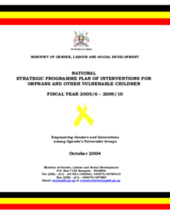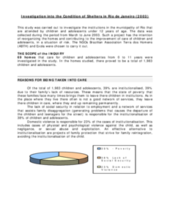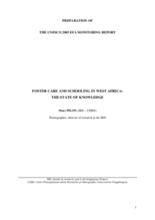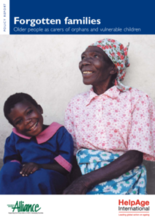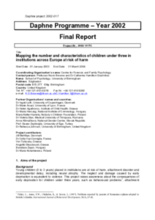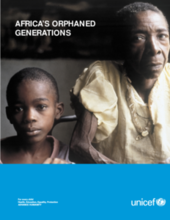Displaying 501 - 510 of 550
The NSPPI provides overall guidance to implementers to mitigate the impact of orphan hood and other vulnerabilities among children in Uganda.
This paper reports on the life circumstances of today’s orphaned children in Africa with new data and fresh analyses. The report presents a strategy for ensuring that all of Africa’s orphaned children have a safe, healthy and well-educated childhood, establishing the foundation for a productive adult life and for their countries’ overall development. Therefore, this paper encourages hope in the face of an epic disaster as it offers the possibility of change for those already orphaned and for the generation to come.
This research study provides statistical information on institutional care of children under the age of 12 in Rio de Janeiro, Brazil. Interviews with institutions and children are conducted, and reasons for separation from family, length of time in care, status of family relationship, religious orientation and financial support of the institutions are highlighted.
A manual which seeks to fill the gap in the methods of estimating the population of orphans and vulnerable children in developing countries. The manual includes thorough guidelines on sampling approaches.
Explores the relationship between fostering and education in West Africa. Identifies special need to focus on protecting and educating young girls.
This paper provides guidelines and tools for policy makers to evaluate the quality of child care initiatives
A brief policy report which highlights issues faced by older caregivers of orphans and vulnerable children in Africa. Outlines NGO responses, challenges and recommendations for programmatic support of older caregivers. Includes statistical data on ageing, HIV/AIDS and kinship care in Africa.
This 15-month project aimed to map the number and characteristics of children under three placed in European institutions for more than three months without a parent as this information was previously unknown.
Current statistics and projections of HIV prevalence and impact on children and families in Sub-Saharan Africa. Outlines a strategy for action which includes collaborative efforts on the part of governments and child-focused agencies to strengthen families, build community capacity and increase awareness.
Slide presentation focusing on the definition of orphans and vulnerable children. Includes a discussion of OVC, child vulnerability and the Millenium Development Goals.

